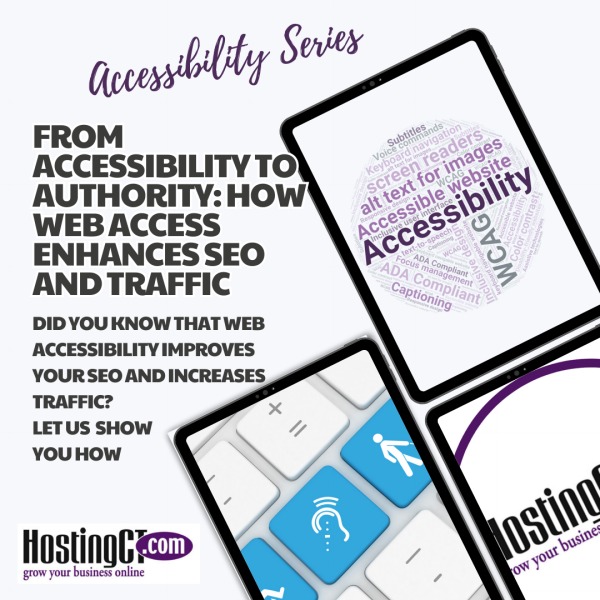From Accessibility to Authority: How Web Access Enhances SEO and TrafficSep252023

In the ever-evolving landscape of online presence, creating a website that is not only visually appealing but also accessible to all users is paramount. Web accessibility refers to designing and developing websites in a way that makes them usable by individuals with disabilities. Which refers to over 1.2 billion people worldwide. This inclusivity not only benefits those with disabilities but also plays a crucial role in enhancing your website's search engine optimization (SEO) and driving more traffic to your products & services. In this article, we'll explore the vital connection between web accessibility, SEO, and increased website traffic.
Understanding Web Accessibility
What is Web Accessibility?
Web accessibility refers to the practice of designing and developing websites that can be used effectively by people with various disabilities. This includes individuals with visual, auditory, cognitive, and motor impairments. An accessible website ensures that everyone, regardless of their abilities, can access and interact with the content.
Why is Web Accessibility Important?
Web accessibility is not just about complying with regulations; it's about fostering inclusivity and equal access to information. It empowers individuals with disabilities to navigate the digital landscape independently. Moreover, accessible websites often lead to better user experiences, which in turn can positively impact a website's overall performance lending itself to increasing your cash flow..
The Intersection of Web Accessibility and SEO
How Accessibility Affects SEO Rankings
Search engines, including Google, strive to provide users with the best possible results. As part of this effort, they consider user experience as a crucial factor in determining search rankings. Websites that prioritize accessibility tend to offer a better user experience, leading to improved SEO rankings.
Search Engines and Accessibility Guidelines
Search engines take accessibility guidelines into account when assessing websites. These guidelines, such as the Web Content Accessibility Guidelines (WCAG), provide a framework for creating accessible web content. Search engines reward websites that adhere to these guidelines with higher rankings.
Key Benefits of Web Accessibility for SEO
Improved Site Usability
An accessible website is inherently more usable for all visitors. Elements like clear navigation, descriptive headings, and readable content benefit everyone. When users can easily navigate and understand your site, they are more likely to stay longer and engage with your content. The longer they stay, the more they get to know you and we all know that people buy from people they know, like and trust. Right?
Reduced Bounce Rates
Bounce rates refer to the percentage of users who leave a website after viewing only one page. Inaccessible websites often have higher bounce rates because users with disabilities may encounter barriers that prevent them from consuming content. By ensuring accessibility, you can decrease bounce rates and encourage visitors to explore further. Ask us about installing heat map software to your site to determine where your users are engaging on your website!
Enhanced Mobile Experience
Mobile devices are now a primary medium for accessing the internet. (63% of Google’s organic search traffic originates from mobile devices) Accessibility improvements often lead to better mobile experiences. As search engines consider mobile-friendliness as a ranking factor (remember Google is the lead on this, followed by YouTube and Bing), an accessible website that functions seamlessly on mobile devices can positively influence SEO.
Implementing Web Accessibility Best Practices
Providing Alternative Text for Images
Alternative text (alt text) is a brief description of an image that is read aloud by screen readers. It helps visually impaired users understand the content of images. Including descriptive alt text not only enhances accessibility but also provides an opportunity to optimize images for relevant keywords.
Creating Semantic HTML
Semantic HTML tags like headings, lists, and paragraphs provide structure to web content. Screen readers use these tags to convey information to users. Using proper heading tags not only improves accessibility but also helps search engines understand the hierarchy and context of your content.
Ensuring Keyboard Navigation
Keyboard navigation is essential for users who cannot use a mouse. An accessible website should allow users to navigate and interact with all elements using only a keyboard. This not only benefits users with disabilities but also improves overall usability and SEO.
The Role of Backlinks in Accessible Websites
Link Building and Accessibility
Backlinks are an integral part of SEO, as they indicate the credibility and authority of a website. Accessible content is more shareable, increasing the likelihood of other websites linking to yours. This, in turn, can enhance your website's backlink profile and contribute to better SEO rankings.
Inclusive Content for Link Building
Creating content that resonates with a diverse audience can attract more backlinks. When your content is accessible and addresses the needs of a wide range of users, it becomes more valuable and shareable. This can lead to natural link building, a significant factor in SEO success.
User Experience and Its Impact on Accessibility and SEO
Page Load Speed and Accessibility
Page load speed is a crucial aspect of user experience and SEO. Accessible websites often have optimized code and streamlined content, which can contribute to faster page load times. A faster-loading website not only improves accessibility but also enhances user satisfaction and search rankings.
Responsive Design and Accessibility
Responsive design ensures that a website functions well on various devices and screen sizes. This aligns with the principles of accessibility, as it caters to users with different abilities who may be using a wide range of devices. A responsive and accessible design can lead to better SEO performance.
Future-Proofing Your Website Through Accessibility
Adapting to Technological Advances
The digital landscape is constantly evolving, and so are the technologies that assist users with disabilities. Prioritizing accessibility ensures your website remains relevant and functional as new tools and devices emerge.
Reaching a Wider Audience
By making your website accessible, you tap into a broader audience that includes people with disabilities. This inclusivity can lead to increased engagement, more sharing of content, and ultimately, a larger and more diverse user base.
The Business Case for Web Accessibility
Legal and Ethical Considerations
Aside from the SEO benefits, there are legal and ethical reasons to prioritize web accessibility. Many countries have enacted laws that mandate websites to be accessible to individuals with disabilities. Failing to comply can result in legal repercussions and damage to your brand's reputation.
Expanding Customer Base through Inclusivity
An accessible website demonstrates your commitment to inclusivity and customer satisfaction. By accommodating users with disabilities, you create a positive brand image and attract a loyal customer base that appreciates your dedication to providing equal access.
Incorporating web accessibility into your website development strategy is a win-win situation. Not only does it empower individuals with disabilities to navigate the digital world seamlessly, but it also enhances your SEO efforts and drives more traffic to your site. By understanding the symbiotic relationship between
Webinar: "5 Positive Effects of Having an ADA Compliant Website - Register Today
 Digital accessibility and ADA compliance are critical for any business with an online presence. There are many benefits to having an accessible website beyond simply meeting legal requirements. Join HostingCT for our upcoming webinar "5 Positive Effects of Having an ADA Compliant Website" October 12th, 19th, or 26th to explore the five key ways an accessible website can improve your business. We'll discuss how an ADA compliant website opens you up to new markets, builds customer trust and loyalty, enhances SEO and conversions, futureproofs your online presence, and protects you legally. Whether you're just starting your website or looking to improve accessibility, you'll gain valuable insights. Reserve your spot today to ensure your business fully capitalizes on the advantages of digital accessibility. Let's work together to create a web that works for everyone! Register today!
Digital accessibility and ADA compliance are critical for any business with an online presence. There are many benefits to having an accessible website beyond simply meeting legal requirements. Join HostingCT for our upcoming webinar "5 Positive Effects of Having an ADA Compliant Website" October 12th, 19th, or 26th to explore the five key ways an accessible website can improve your business. We'll discuss how an ADA compliant website opens you up to new markets, builds customer trust and loyalty, enhances SEO and conversions, futureproofs your online presence, and protects you legally. Whether you're just starting your website or looking to improve accessibility, you'll gain valuable insights. Reserve your spot today to ensure your business fully capitalizes on the advantages of digital accessibility. Let's work together to create a web that works for everyone! Register today!




